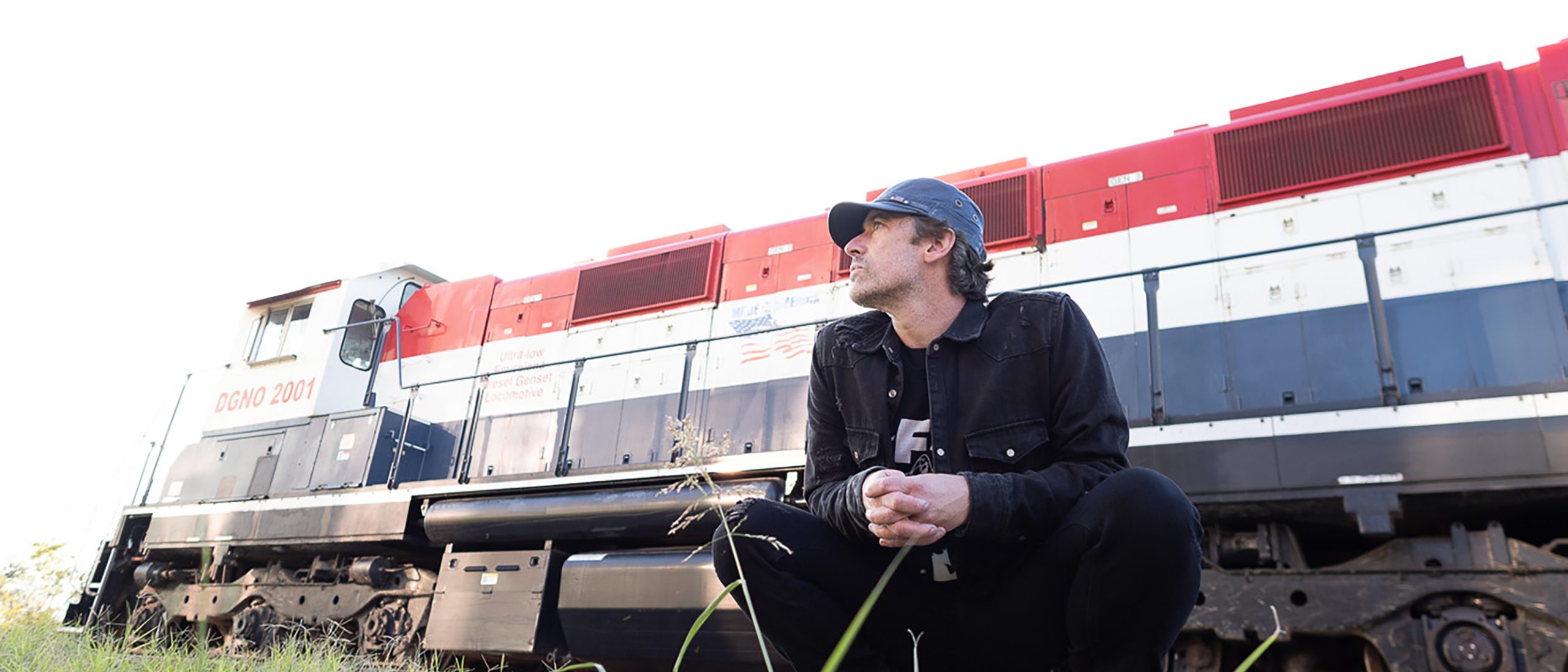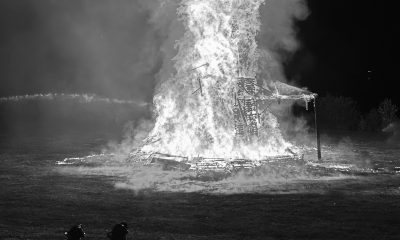Album Review
Scaling New Heights: A Review of Michael Zuzek’s Everest LP

In an era where the musical landscape is as diverse as the peaks of the Himalayas, Michael Zuzek’s latest LP, Everest, stands as a towering achievement that boldly scales the lofty aspirations of classic rock. A self-engineered, produced, and mastered effort alongside Aidan Ellison, *Everest* is an ambitious, introspective journey that reflects both the weight of emotional highs and the depths of personal valleys.
The album opens with “The Man Who’s Never Found,” a track that immediately sets the tone for the LP’s thematic exploration of solitude and the quest for identity. Zuzek’s vocals, tinged with a weary yet resilient edge, carry the narrative of a man wandering through life’s desolate roads, seeking something elusive. The collaboration between Maarten Colenbrander and Scott Fordham on bass, coupled with Marco Ciardullo’s evocative guitar work, creates a rich, layered soundscape that complements Zuzek’s poignant piano and synth lines. The song’s narrative evokes a sense of yearning and disillusionment, reminiscent of the existential musings found in Springsteen’s *Nebraska*.
“All Comes Back” serves as a cathartic response to the opener’s despair, offering a glimpse of redemption amidst the chaos. Zuzek’s use of the piano and organ here is particularly notable, blending seamlessly with Scott Fordham’s bass and Ciardullo’s guitar to create a soulful, almost gospel-like atmosphere. The song’s lyrics suggest a cyclic nature of life’s trials and tribulations, with the recurring refrain “it all comes back to you” acting as both a warning and a comfort. There’s a subtle nod to Robbie Robertson’s influence, not just in the composition but in the thematic depth that reflects the cyclical struggle of life, akin to The Band’s explorations of American mythology.

With “5000 Days,” Zuzek dives into the themes of loss and the relentless passage of time. The track’s driving rhythm and haunting melodies evoke a sense of urgency, as Zuzek’s lyrics recount the pain of separation and the longing for reconciliation. Ciardullo’s guitar work once again shines, weaving in and out of Zuzek’s emotive piano lines, while Colenbrander’s bass provides a steady foundation that grounds the song’s emotional weight. The song’s energy and tempo—a brisk 180 BPM—capture the frantic attempt to reclaim lost time, a sentiment that resonates deeply with the listener.
“No Other” is perhaps the most heart-wrenching track on Everest, a love song that veers away from sentimentality and instead delves into the darker corners of human relationships. Zuzek’s lyrics explore the push-and-pull of a relationship fraught with misunderstanding and emotional distance. Brandon Marks’ guitar work, alongside Leah Vanderbyl’s drumming, adds a sharp, almost discordant edge to the track, mirroring the tension between the song’s protagonists. The contrast between the verses and chorus, with their differing tempos, reflects the instability of the relationship Zuzek sings about—a dissonance that ultimately feels cathartic.
“Sweet and Kind” provides a momentary respite in the album’s emotional journey, offering a softer, more reflective tone. The interplay between Zuzek’s piano, E-piano, and organ, along with Colenbrander’s bass and Ciardullo’s guitar, creates a lush, almost ethereal soundscape. The lyrics, however, suggest an underlying tension, as Zuzek sings of a love that is fleeting, always just out of reach. The song builds slowly, never quite reaching a climax, much like the unfulfilled promises it describes.
The existential dread reaches its peak with “Has My God Forsaken Me?”, a track that plunges the listener into the depths of despair and doubt. The song’s heavy organ and synth, combined with a relentless bass line and Ciardullo’s ominous guitar riffs, create an atmosphere thick with foreboding. Zuzek’s vocal delivery is raw and unfiltered, as he grapples with themes of abandonment and loss of faith. The track’s intensity is only heightened by its placement within the album, serving as a dark mirror to the fleeting moments of hope found earlier.
Closing the album is “Graystone,” a track that encapsulates the themes of memory and nostalgia that permeate *Everest*. Zuzek’s piano-driven melody is hauntingly beautiful, with Fordham’s bass and Colenbrander’s acoustic guitar adding layers of warmth and depth. The song reflects on the passage of time and the remnants of the past, much like a weathered stone that still holds the echoes of history. Zuzek’s lyrics are introspective, touching on the bittersweet nature of memory and the inevitability of change. It’s a fitting end to an album that has journeyed through both the peaks and valleys of the human experience.
Everest is a masterclass in modern rock songwriting, blending introspective lyrics with rich, textured instrumentation. Michael Zuzek’s ability to craft songs that resonate on both a personal and universal level is evident throughout the LP. The collaborative efforts of the musicians, particularly Ciardullo’s versatile guitar work and Colenbrander’s steady bass, elevate the album to a sonic landscape that feels both vast and intimate.
In Everest, Zuzek has created not just a collection of songs, but a cohesive narrative that explores the complexities of life’s emotional terrain. It’s an album that invites the listener to reflect, to feel, and ultimately, to understand the beauty in the climb, no matter how steep the path.
-Albert Ignatius
Album Review
Saint Escape sets the past on fire with latest release “Look At What You Made”

Saint Escape isn’t here to reconcile the past, they’re here to torch it. Now, with the release of their new single “Look At What You Made,” Saint Escape have unleashed a punishing, nu-metal-infused anthem that just sounds like an equal measure of reckoning and release. It is loud, confrontational, and honest, exactly what a purging rock record should be.
Produced and mixed by Joe Rickard, Starset, Three Days Grace, Breaking Benjamin, the track delivers a tight punch that fuses wild aggression and arena-sized power. “Look At What You Made” doesn’t stop. Rickard’s slick production redoubles Saint Escape’s raw edge rather than sanding it down, and the song takes on a huge, modern rock sound without losing its bite.
“Look At What You Made” is a primal response to toxic authority figures, the kind who kept order through fear, misinformation, and control, and knew where best to leave emotional scars. On “Look At What You Made,” the anger boiling beneath the surface becomes something purposeful, an anthem for anyone who’s been moulded by manipulation and left in its wake. The effect is communal shake-off, a determination not to be shaped by the past.
And lead vocalist Matt Cox provides a threatening, buffed clean vocal performance, of sorts as well, one that’s heavy with anger and determination. There is rage here, but also clarity, a sense that this is less about revenge than about reclaiming autonomy. As Cox puts it, the song is a purge, a reminder that the future belongs to those willing to to take it back. “Look At What You Made” is a testament to strength and newfound independence, it’s further evidence that Saint Escape are bleeding their past into something louder, stranger, and harder to ignore.
Album Review
Big O redefines artistic evolution with “When it’s Not Said, But Done” album

Big O’s “When it’s Not Said, But Done” is a whisper of transformation narrated through rhythm, texture, and space. Across its fifteen tracks, spanning just under forty-seven minutes, Big O sacrifices flash for feeling and ego for essence.
The production feels like an artist who has finally quit chasing something external and is instead listening inward. The flow of the album is methodical but organic, with each track leading into the other as if they were diary entries. On “Free Spirit,” Big O creates a soundscape that embodies freedom in action, with rhythms that propel you forward. It’s one of those rare songs that can be at once contemplative and propulsive, with a slow revelation. And also, “New Found Joy” is an anthem for rebirth.
Big O’s production vision here is sweeping and cinematic, but also intimate. The presence of live musicians gives an organic texture. Jeronimo G’s xylophone on track nine tolls like an intimate conversation, while IB Delight’s saxophone on track ten blows satisfying warmth and longing into the mix. These collaborative moments are the crucial parts of Big O’s unfolding language.
Every choice, from the minimal artwork by Andriyan Robby to the in-house mixing and mastering by Big O himself, is consistent with the album’s spirit of transformational thought. In “When it’s Not Said, But Done,” Big O has created a statement on silent courage. It is an album for those who know that, in reality, real change does not need to be shouted from the mountaintops, but only heard, felt, and lived.
-

 Artist Spotlight3 days ago
Artist Spotlight3 days agoGOODTWIN shares reflection with indie-pop single, “Soak It Up”
-

 Artist Spotlight1 day ago
Artist Spotlight1 day agoMORPHEUS VON DOBENHAUSEN lets go of the chaos, dancing steady soft and slow in latest release “GOODBYE CHAOS”
-

 Artist Spotlight1 day ago
Artist Spotlight1 day agoSkillMusicsa speaks in silence when love fades with latest release “How Could You”
-

 Artist Spotlight1 day ago
Artist Spotlight1 day agoSAMSARA transforms quiet heartbreak into a modern rock journey on latest release “mrs. porter”
-

 Artist Spotlight1 day ago
Artist Spotlight1 day agoTom Woodward exposes the dark side of modern idol worship in latest release “PHONEY MESSIAH”
-

 Artist Spotlight1 day ago
Artist Spotlight1 day agoSavvie steps out with an anthem of power and perseverance on latest release “Incredible”
-

 Artist Spotlight1 day ago
Artist Spotlight1 day agoMarcello Cordova turns loss into light on latest release “Jan 3rd (I Wish We Would Have Had More Time)”
-

 Artist Spotlight1 day ago
Artist Spotlight1 day agoTatiKa listens to the quiet voice within, trusting the unseen with her latest release “I Could Tell”













